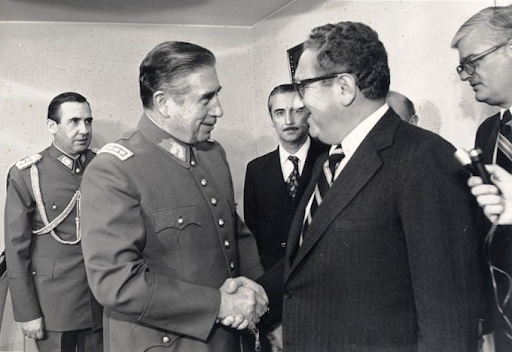The US helped to overthrow Allende, a well-known Marxist leader backed by the repressive Soviet Regime and Fidel Castro. But at what cost? More deaths and repression would continue to ensue under Pinochet, followed by a mass purge of supposed left-wing supporters.
The period of Pinochet’s regime was one of brutal repression and political persecution. In just a few months of his presidency, thousands of Chileans were captured and held in the national stadium, where many were executed. It is said that thousands of soldiers, military leaders, and civilians were killed or ‘disappeared’ during Pinochet’s dictatorship.
After his rise to power, Pinochet persecuted leftists, socialists, and political critics, resulting in the executions of from 1,200 to 3,200 people, the internment of as many as 80,000 people, and the torture of tens of thousands.
- The Guardian
Interview with John Dinges, opposition journalist during the Pinochet regime and author of The Condor Years: How Pinochet And His Allies Brought Terrorism To Three Continents
In August 1987 the Pinochet government imposed an extraordinarily repressive labor code that bars trade unions from political activity and requires sworn statements from union leaders that they do not belong to any political party. Collective bargaining is limited to the single work site, preventing effective company-wide or industry-wide bargaining. A strike may last only 60 days, at which time workers must accept the employer's last offer or abandon their jobs.
-Lance Compa, The Washington Post, 1988

Augusto Pinochet with Henry Kissinger [Credit: The National Security Archive]
The Agencia Publicitaria de Servicios Informativos (APSI) was founded in 1976, and we were legal but we didn’t get to say publicly that we were in opposition to the Pinochet dictatorship even though, in fact, we were. We had to issue every submission to the government in advance, so it was prior censorship. We were forbidden to write about Chile itself - kind of funny, right?
It was international news, basically. We reported on Brazil, Jimmy Carter’s election, and his emphasis on human rights, the Palestine struggle, Africa - we tried to provide news in-depth about international stories that were parallel to issues important in Chile. We would write about “The Opening to Democracy in Brazil: The Dictatorship That Allowed Free Elections” or something like that, it was pretty obvious that it was relevant to people in Chile. We got away with this for several years.
- John Dinges, opposition journalist under the Pinochet regime
The declassified record shows that Secretary of State Henry Kissinger was briefed on Condor and its 'murder operations' on August 5, 1976, in a 14-page report from [Harry] Shlaudeman [Assistant Secretary of State]. 'Internationally, the Latin generals look like our guys,' Shlaudeman cautioned. 'We are especially identified with Chile. It cannot do us any good.'
— August 5, 1976 Harry Shlaudeman briefing to Henry Kissinger, Secretary of State
A memorandum to Kissinger asking for economic and military aid from the CIA on behalf of Chile [Credit: National Security Archive]
There were lots of scary parts when I was living under the Pinochet regime. We interviewed people in the resistance fighting against the dictatorship. I was with my sister, we were not in the house, but the secret police came looking for us. We went to the US Embassy, and it was under the Jimmy Carter government, so it was when human rights was more part of US Foreign policy. The Chilean Counsel took us under his wing […] when we left, he escorted us to the airplane and make sure they didn’t arrest us. Especially in the airport, it was scary, because we were smuggling tapes of people we interviewed under the resistance. I couldn’t know I was safe until I got on that plane.
— Margaret Power, political researcher in Chile during the Pinochet regime
The March of the Empty Pots and Pans was on an early morning in December of 1971: it was a large march of around 5000 protestors against the Allende regime, most of them women. It promoted the idea that anti-Allende and conservative women were principal social actors against this sort of political drama. The right was more astute and able to organize and mobilize women than the left was. You can see that the election of 1973, the majority of women voted against Allende. In the United States, women tended to be more progressive, but in Chile, it was the opposite. The men were more progressive and the women were more conservative.
— Margaret Power
There was no brutality in the political prisons that I saw […] they had already been tortured at this point. The food was terrible. My sister and I made them a pizza once and smuggled it to them to eat. I think that was the first time they had eaten pizza in their life.
— Margaret Power